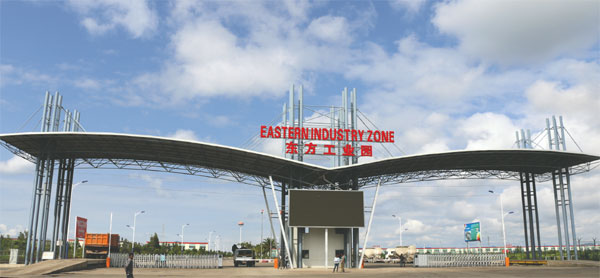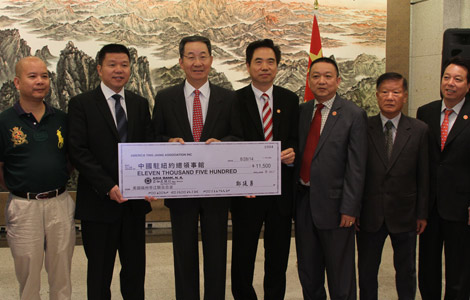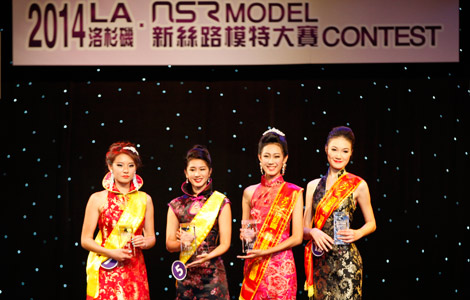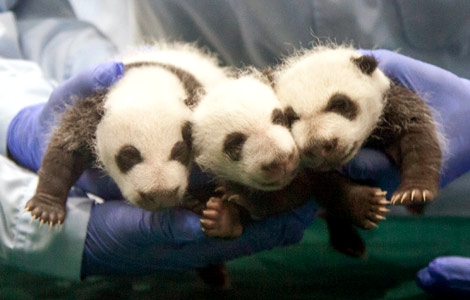Chinese optimism in Ethiopia
Updated: 2014-08-29 12:32
By Chen Weihua(China Daily USA)
|
||||||||
|
The Eastern Industry Zone in Dukem, about 37 km from Addis Ababa, is home to about 20 Chinese-invested manufacturing companies employing thousands of local workers. Photos by Chen Weihua / China Daily |
While Chinese companies investing in Africa are often accused in the West for extracting resources and not hiring locals, the real picture is starkly different, Chen Weihua reports from Addis Ababa.
The early morning scene is brisk at the gigantic gate that resembles two spreading wings. Shuttle buses arrive and local Ethiopian workers pour through the gate, most wearing green T-shirt uniforms.
It is a scene that cannot be missed by people driving through Dukem, a small town along the busy highway linking Addis Ababa, the capital of landlocked Ethiopia, to the port of neighboring Djibouti.
Far behind the gate, a well-groomed landscape surrounds a dozen new factories, offering sharp contrast to the nearby area of mostly farmland and dilapidated houses.
This is the Eastern Industry Zone (EIZ), the first such zone in Ethiopia and located about 37 km from Addis Ababa. It is home to some 20 Chinese-invested companies, from shoe making, textile and garments to automobile, steel, cement and packaging.
When started in 2009, it covered 5-square kilometers. Now EIZ offers 130,000 square meters of industrial space fully equipped for modern manufacturing with a guaranteed power and water supply, an efficient sewage system, roads and landscaping.
The workers in green uniforms are some of the 3,200 Ethiopians hired by Huajian Shoes, which makes shoes mostly for the North American market for brands such as Guess, Nine West and Naturalizer.
The largest employer in the EIZ not only provides them with free transportation to and from the nearby towns of Dukem and Debre Zeit, but also serves free meals each day starting with breakfast.
Job creators
Esrael Etefa, 24, has worked at Huajian Shoes for three years. He was trained at its Dongguan factory in South China's Guangdong province with 88 other Ethiopian workers.
Speaking quite good Chinese, Etefa likes to introduce himself as Fazhan, his Chinese name meaning "development". It was given to him by Huajian's legendary founder and entrepreneur Zhang Huarong, who built the shoe-making empire from scratch in the 1980s.
"The work here is hard, but I like the work environment because it teaches us how to overcome challenges," Etefa said in Chinese while eating a Chinese-style lunch in the canteen. Most of his Ethiopian coworkers prefer their own cuisine, known as Injera.
Natty Abebe has also worked at Huajian for three years since it started in the EIZ in 2011. He said the pay is good although overtime often means a workday from 7 am to 8 pm.
"Management treats us well and I learned a lot here," said the 26-year-old with a degree in hotel management from the University of Addis Ababa and now an assistant to the workshop manager.
A short walk from Huajian pass a beautifully landscaped circle is the assembly plant of Lifan Motors with some 50 new sedans, SUVs and micro vans parked in a lot.
Nearby, Alemayehu Gizachew, the deputy plant manager, was testing a new micro van. He made sharp turns and then hit the brake, looking satisfied with the van's performance.
The 36-year-old was an official in the Ethiopian government's automobile maintenance department before joining Lifan five years ago. He described Lifan as a good company and said that the cars assembled in Ethiopia are growing in popularity locally.
Lifan now accounts for half of the 1,500 new car sales each year in Ethiopia where 90 percent of the market is still dominated by used cars, many dumped by industrialized countries. Lifan Motors Ethiopia has 160 workers, including seven from China. Its current assembly capacity could produce 5,000 cars a year with two work shifts.
Most Viewed
Editor's Picks

|

|

|

|

|

|
Today's Top News
Bay Area takes lessons from Napa quake
US urged to stop recon
US firm partners with stevia maker
Microsoft CEO 'en route to Beijing'
US, China to parley on extradition of criminals
US rice could see potential market in China
China accuses US over 'close-in reconnaissance'
EB-5 visa ceiling is short-term, expert says
US Weekly

|

|
















